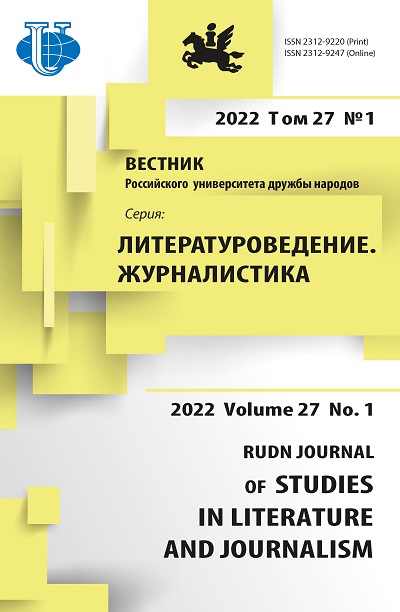“Technogeneous” Imagery of Alexander Eryomenko’s Poetry in the Context of Evolution of his Romantic World Outlook
- Authors: Ankudinov K.N.1
-
Affiliations:
- Adyghe State University
- Issue: Vol 27, No 1 (2022)
- Pages: 39-54
- Section: LITERARY CRITICISM
- URL: https://journals.rudn.ru/literary-criticism/article/view/30719
- DOI: https://doi.org/10.22363/2312-9220-2022-27-1-39-54
- ID: 30719
Cite item
Full Text
Abstract
The article deals with “technogeneous” imagery in the poetry of Alexander Eryomenko. In his texts of the 1984-1986 period technical and scientific images are often compared with natural objects. This topic has been understudied. Various statements have been made by philologists about the ethical dimension of this imagery. The main aim of this article is to disprove these statements. Poetic texts of the later period (1987-1989) are devoted to politics. The purpose of this article is to identify the link between the two periods of his work. The task is to reveal the ideological orientations of these periods. Poet actively opposed his art to Soviet ideology and Russian nationalists. The author of the article suggests the following thesis: the two periods correspond to two stages which show how his romantic world outlook unfolded. Alexander Eryomenko first absolutized the mechanistical nature of the outside world (“Non-I”), and later singled out the “image of the enemy” in it. In the postSoviet period (after 1991) the poet gave up both political and poetic activities. The reason for it is the exhaustion of the romantic conflict and the “image of the enemy”. Philology has studied the issue of the romantic world outlook in contemporary literature insufficiently. The methodology of this article reveals its potential results.
Keywords
About the authors
Kirill N. Ankudinov
Adyghe State University
Author for correspondence.
Email: ankudinovkirill@rambler.ru
ORCID iD: 0000-0002-3474-672X
Candidate of Philology, Docent, Department of Literature Science and Journalism
208 Pervomayskaia St, Maykop, 385000, Russian FederationReferences
- Epsteyn, M. (1989). The Paradoxes of Novelty. On Literary Development of the XIX–XX Centuries. Moscow: Sovietskij pisatel publ. (In Russ.)
- Eryomenko, A. (1987). Twelve Years in Literature. Jynost, (3), 54–56. (In Russ.)
- Eryomenko, A. (1990). In Addition to Resistance of Materials. Poems. Moscow: Pravda publ. (In Russ.)
- Eryomenko, A. (1991). Poems. Moscow: IMA-press publ. (In Russ.)
- Kibirov, T. (1994). Sentiments. Eight Books. Belgorod: Risk publ. (In Russ.)
- Kukulin, I. (2003). “Dreary Forest” is a Subject Strong Demand. New Literary Observer, (59), 359–381. (In Russ)
- Leyderman, N., & Lipovetsky, M. (2003). Contemporary Russian Literature: 1950–1990. Vol. 2 (1968–1990). Moscow: Akademia publ. (In Russ.)
- Lotman, Y. (2019). Culture and Explosion. Conversations about Literature. Moscow: AST publ. (In Russ.)
- Masalov, A. (2019). Functional-semantic Features of Metabola in the Metarealistic Poetry of Alexander Eryomenko. Ural Philological Bulletin, (3), 142–155. (In Russ.)
- Tokarev, A. (2016). Metarealism as a Alexander Eryomenko’s Method. Philological Sciences. Questions of Theory and Practice, (11), 48–51. (In Russ.)
- Versovin, A. (1990). Alexander Polezjayev: Poems. Translations. Contemporaries’ Memoirs. Moscow: Pravda publ. (In Russ.)
Supplementary files















